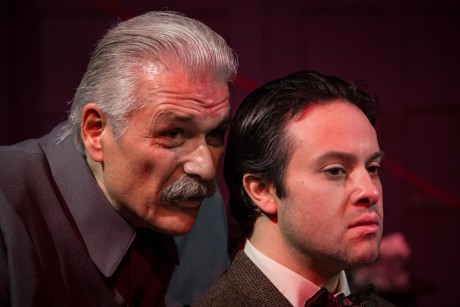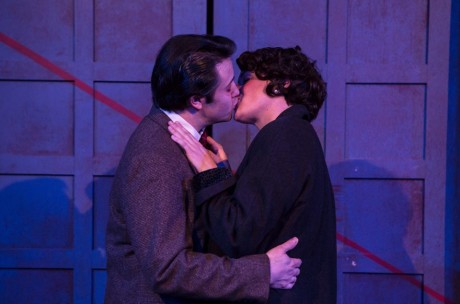In these days of a re-igniting Cold War between Russia and the United States, those old grainy black-and-white films of a long thought dead dictator, Comrade Joseph “Uncle Joe” Stalin are being dusted off and brought back to animated life for the next few weeks.
And, what does that have to do with theater? Easy, answer. With its intrepid, determined production of the 2012 conspiracy-laden, political thriller Collaborators by the British playwright John Hodge, an ever prescient Spooky Action Theater woos audiences with a fictionalized account of life without artistic freedom, inconsequential privacy, a hard-drive for choking political correctness, and constant fear of being denounced. Imprisonment, if not worse, awaited those who did not conform.

The Spooky Action production of Collaborators is a Washington area premiere of the 2012 Laurence Olivier Award for Best New Play. Playwright Hodge may perhaps be better known on this side of the Pond, for his Academy Award nominated screenplay for the film Trainspotting.
Collaborators is a fascinating account of events in Moscow in 1938 before the German invasion of the Soviet Union. The days are dark for intellectuals, artists and anyone considered an enemy of the State. Progress and the greater good were defined by one person, Stalin. In the play, dissident Russian playwright Mikhail Bulgakov is the center of attention; well at least in his own mind. He has written books and plays that raised doubts about his loyalties to the burgeoning powers of the new Soviet leadership. There is to be a price paid for his insolence. That price is the arc of Collaborators.
Under Richard Heinrich’s direction there is an unswerving dark vitality with moments of sly humor to the underground “samizdat” quality he sets for the grey-toned intrigue. (Samizdat is a Russian word for a dissident underground publication that was passed around trusted friends in the days before contemporary Russian musical groups such as Pussy Riot were more open dissenters.
Playing Bulgakov and making his Spooky Action debut is Paul Reisman (veteran of Faction of Fools, Taffety Punk, and Shakespeare Theatre Company). Reisman gives his performance an impression of nervous bewilderment as he is hooked, then drawn into a game with game for which he is well over his head. Reisman not only verbally stumbles with tics of fear, but holds himself physically vulnerable and tense from the moment we first see him having a nightmare, then wakening to answer an insistent knock on the door. Knocking are two Soviet secret police.
The two secret policemen portray a good cop/bad cop routine. They will be return often to fill Bulgakov’s life with distress. And for the audience often take over the spotlight with their presence. One is a talkative Vladamir, an ironic politically comic, light on his feet G. Michael Harris with an accented delivery of his words. The other more silent presence is an unnerving, lurking, slick Sha Golanski as Stephan.
The audience meets as well Bulgakov’s steadfast wife Yelena (played with unswerving, “cool” solidness by MacKenzie Beyer) and a gaggle of friends, cohorts and apartment dwellers attracted to Bulgakov’s anti-Soviet stance (Steve Beall, Kim Curtis, Ryan Carlo Dalusung, Liz Dutton, Willem Krumich, Matthew Marcus, Amal Saade, Mindy Shaw, and Robert Bowen Smith all deliver excellent performances). They too are living in fear worrying about finding themselves in an interrogation cell being made to confess.
Soon enough Bulgakov has a deal thrust in his face by the secret police. His plays will be banned unless he writes a new play. This one to lionize Joseph Stalin on his 60th birthday. At first reluctant, after all he is a dissident, Bulgakov has little choice. Accept the special commission or not only will his plays be banned, but his wife will be harmed and his friends suffer. He has four weeks to write the play. At first he has writer’s block. But then a miracle in a land without faith. He gets a late night call from a mystifying source.
Traveling into the deep underground he finds himself face-to-face with “Uncle” Joe Stalin. And from that meeting Bulgakov becomes what he never expected to become; drawn into becoming a collaborator.
The play turns itself into something more than just underground political eye-candy by the performance of the ever-charming, always irrepressible, without-a-care, ruthless work of Joe Duguette as “Uncle” Joe Stalin. Duquette toys both with Reisman and the audience. The audience watches in silent awe as Duguette works not so much by physical brute force, but by seductive guile. Duguette’s physical presence is a smooth gait, a hardy laugh, and in several key scene while sitting at a table typing away, his fingers have a bright cadence as he types away on an old-fashioned typewriter. His fingers dance over the keys, his face lit and his eyes bright.
But worry not, this is no soft, limp revisionist Stalin. Duguette reminds Bulgalov that “in a conflict between man and a monster,” the latter will win. We may know that from history Stalin’s real history, but still we intently follow along watching as Reisman finally realizes he has made a bargain with a monster. Consequences will follow for his friends, his country, and himself.

The Collaborators‘ production design team has provided a paranoid’s dream for its visions of political darkness. And on the bleak, brutally cold evening I attended the performance, I did think I was in Moscow as I walked to the beautiful late 19th Church basement that Spooky Action calls home. Set design is by Giorgos Tsappas, sound design from David Crandall, lighting by Brian S. Allard , with costume design by Alisa Mandel.
Tsappas places the production into an ally setting with risers so that the audience not only sees the performance before them, but also reactions of other audience members. There are ramps and the steps into the risers are regularly used by the actors. At one end of the set is a bed. At the other is an area that can be an office, an interrogation room, or even a living room with well- used double-pocket doors that hide away other rooms. The pocket doors are employed with great effect in entrances and exits. The set’s overall color scheme and usual sound scape is that of oppression; few bright colors.
Collaborators makes darkness visible. Can the arts and creative imagination be a balancing force against evil? Can one make a bargain with a monster and ever come out alive? For those with an interest in the Cold War as a signpost to current world events or those fascinated by The Americans on FX or the movie Bridge of Spies, perhaps take a chance on something unseen before in the DC area. Collaborators is a theatrical experience you won’t want to miss.
And then there is this line of dialogue from Collaborators:
They say that when a man is going to drown, when he finally gives up the struggle – it’s sort of blissful, for a moment. And then he drowns.
Running Time: Two hours and 15 minutes, with one intermission.
Collaborators plays through March 13, 2016 at Spooky Action Theater performing at the Universalist National Memorial Church – 1810 16th Street, NW, in Washington, DC. For tickets, purchase them online.
LINK:
Meet The Cast of Spooky Action Theater’s ‘Collaborators’: Part 1: Paul Reisman.
RATING:





